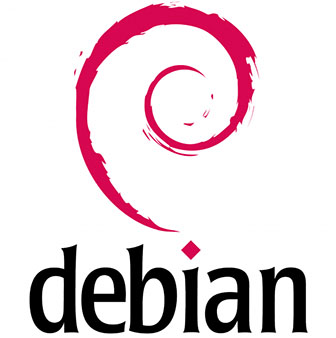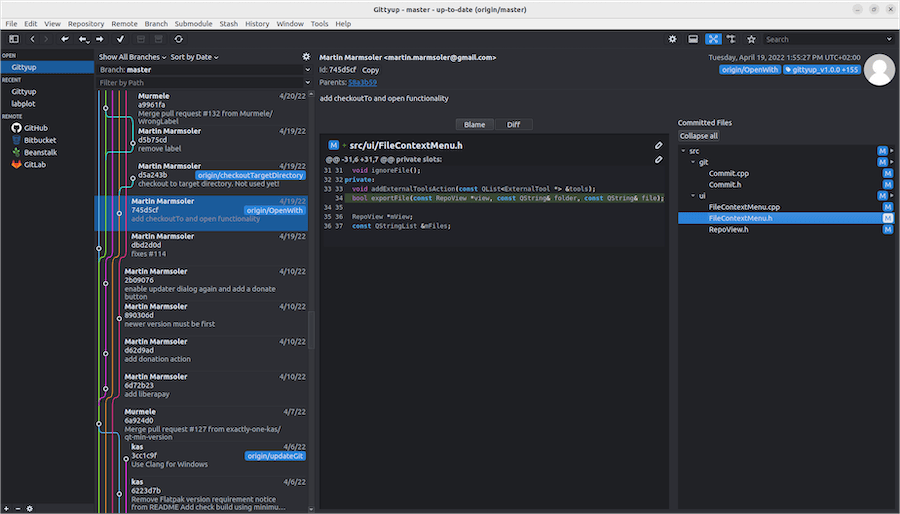How To Install Gittyup on Debian 12

In this tutorial, we will show you how to install Gittyup on Debian 12. Gittyup is a powerful Git client designed for advanced users who require a robust and feature-rich interface for managing their Git repositories. With its sleek and modern user interface, Gittyup simplifies complex Git operations, making it an invaluable tool for developers, system administrators, and anyone working with version control systems.
This article assumes you have at least basic knowledge of Linux, know how to use the shell, and most importantly, you host your site on your own VPS. The installation is quite simple and assumes you are running in the root account, if not you may need to add ‘sudo‘ to the commands to get root privileges. I will show you the step-by-step installation of the Gittyup graphical Git client on a Debian 12 (Bookworm).
Prerequisites
- A server running one of the following operating systems: Debian 12 (Bookworm).
- It’s recommended that you use a fresh OS install to prevent any potential issues.
- SSH access to the server (or just open Terminal if you’re on a desktop).
- An active internet connection. You’ll need an internet connection to download the necessary packages and dependencies for Gittyup.
- A user account with sudo privileges to execute administrative commands.
Install Gittyup on Debian 12 Bookworm
Step 1. Updating Debian 12.
Before installing Gittyup, ensure your Debian operating system is up-to-date. Updating the system helps you get the latest security patches and package improvements. Run the following command to update and upgrade all existing packages on your system:
sudo apt update sudo apt upgrade
Step 2. Installing Dependencies.
Gittyup relies on several dependencies to function properly on Debian 12. These dependencies include libraries and tools that provide the necessary functionality for Gittyup’s features. To install the required dependencies, run the following command in your terminal:
sudo apt install git libgtk-3-dev libwebkit2gtk-4.0-dev libsecret-1-dev libsoup2.4-dev libsqlite3-dev libxml2-dev libzip-dev valac
Step 3. Installing Git.
Gittyup relies on Git for managing Git repositories, so it’s crucial to have Git installed on your system. Fortunately, Git is available in the Debian 12 repositories, making the installation process straightforward. Run the following command to install Git:
sudo apt install git
After the installation is complete, verify that Git is properly installed by checking its version:
git --version
Step 4. Installing Flatpak.
Flatpak is a popular package management system for Linux that allows you to install applications in a sandboxed environment. To install Gittyup using Flatpak, follow these steps:
sudo apt install flatpak
Add the Flathub repository:
flatpak remote-add --if-not-exists flathub https://flathub.org/repo/flathub.flatpakrepo
Step 5. Installing Gittyup on Debian 12.
Once Flatpak is installed and configured, you can proceed with the installation of Gittyup:
flatpak install flathub com.github.francescomalatesta.Gittyup
Once Flatpak is installed and configured, you can proceed with the installation of Gittyup:
flatpak install flathub com.gittyup.Gittyup
This command will download and install the latest version of Gittyup from the Flathub repository. The installation process may take a few minutes, depending on your internet connection speed.
Step 6. Accessing Gittyup on Debian.
After the installation is complete, you can launch Gittyup from your desktop’s application menu or by running the following command in your terminal:
flatpak run com.gittyup.Gittyup

Step 7. Troubleshooting Common Issues.
While the installation and configuration process for Gittyup on Debian 12 is generally straightforward, you may encounter some issues along the way. Here are some common problems and their solutions:
- Flatpak installation issues: If you encounter problems during the Flatpak installation process, try running the following commands to reset and repair the Flatpak installation:
flatpak repair flatpak uninstall --unused
- Dependency conflicts: In some cases, dependency conflicts may arise, preventing Gittyup from running properly. If you encounter such issues, try updating your system packages and reinstalling Gittyup:
sudo apt update sudo apt upgrade flatpak uninstall com.gittyup.Gittyup flatpak install flathub com.gittyup.Gittyup
- Git integration issues: If Gittyup is unable to detect or communicate with your Git installation, ensure that Git is installed correctly and added to your system’s PATH variable. You can check the Git installation by running
git --versionin your terminal. - Performance issues: Gittyup is a resource-intensive application, and you may experience performance issues on older or underpowered systems. In such cases, try closing other running applications or consider upgrading your system’s hardware.
- Rendering issues: If you encounter rendering or display issues with Gittyup, ensure that you have the latest graphics drivers installed for your system. You can also try running Gittyup with the
--disable-gpuflag to disable hardware acceleration:
flatpak run --env=DISABLE_GPU=1 com.gittyup.Gittyup
If you encounter any other issues or have specific questions, consult the official Gittyup documentation, forums, or community channels for further assistance.
Congratulations! You have successfully installed Gittyup. Thanks for using this tutorial to install the latest version of the Gittyup graphical Git client on Debian 12 Bookworm. For additional help or useful information, we recommend you check the official Gittyup website.